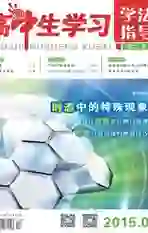时态中的特殊现象
2015-08-18彭现省
彭现省
1. 以here或there开头的句子,说明正在发生的动作,谓语动词不用现在进行时,而用一般现在时。例如:
Here comes the bus!
There goes the bell!
2. 既定的时间如生日、日历、课时安排、交通时间表等,通常用一般现在时表示将来的动作。例如:
The meeting starts at five oclock.
The train leaves at three this afternoon.
3. 在see to it, make sure, make certain, be sure, look out, take care等之后的从句要用一般现在时/一般过去时/现在完成时代替一般将来时/过去将来/将来完成时。例如:
You must make sure the door is closed before you leave the lab.
See to it that everything is OK.
4. 在宾语从句中,表示客观事实或真理,一律用一般现在时。例如:
The teacher taught us yesterday that the moon circles the earth.
Somebody told me that you are a writer.
5. 在由as soon as, when, before, after, till等引导的时间状语从句和由if,unless, as long as, in case等引导的条件状语从句中,或在方式、让步状语从句中,常用一般现在时代替将来时,但主句用一般将来时。例如:
If you come this afternoon, Well have a meeting.
1. 表示说话人始料未及的事情用一般过去时。例如:
Oh! I didnt know you were in Shanghai.
2. 在wish, would rather之后的宾语从句中和在as if引导的状语从句中,以及在it is time that...句型的定语从句中,谓语动词用一般过去时说明现在的事情。例如:
Its time you had a holiday.
He looks as if he were young.
3. 用表示意愿及精神状态的动词,反映说话者探寻的态度时,动词用一般过去时表示一般现在时,显得更加礼貌。例如:
I didnt know you were here.
我不知道你在这里。(were实际上指现在)
I wondered if you could help me.
我在想你是否能帮助我。
4. 在含有hardly/scarcely... when, no sooner... than结构的句子中,主句用过去完成时,从句用一般过去时。
Hardly had I entered the room, when I heard a loud noise.
1. 若句中带有always, all the time, forever, constantly等词或短语,则用进行时表示一个频繁发生的动作,表示说话人赞赏或厌恶等感情。例如:
You are always forgetting the important things.
你总是忘记重要的事。
2. 某些词如come, go, leave, arrive, start等可用现在进行时表示将来。例如:
He is leaving tomorrow.
The visitors are arriving in a few minutes.
1. 表示故事发生的背景。例如:
One day Jones was walking along the street.
一天,琼斯正在街上走。
It was snowing as thay made their way to the front.
他们往前面走的时候正在下雪。
2. 与always, forever, constantly, continually, frequently等词连用,表示过去经常发生的行为,往往带有感情色彩。例如:
My brother was always losing his key.
我的哥哥/弟弟老是掉钥匙。
They were frequently quarrelling.
他们老是吵架。
1. 被the first time, a few times, again and again等表示次数或重复的状语修饰时,句中常用现在完成时。例如:
This is the third time we have made improvements in that equipment.
这是我们第三次升级那个设备。
2. 定语从句的先行词是最高级形式或被最高级形容词修饰时,句中常用现在完成时。例如:
Scientists have found almost all metals are good conductors, the best of which is silver.
科学家们发现几乎所有的金属都是良导体,其中最好的是银。
3. 在某些时间状语从句或条件状语从句中,用现在完成时表示将来完成的动作。例如:
Ill go to your home when I have finished my homework.
我做完作业就去你家。
If it has stoppted snowing in the morning, well go to the park.
如果早上雪停了,我们就去公园。
1. 某些动词的过去完成时表示原先计划或打算做而没有做的事情。常见的动词有mean, plan, think, suppose, want, intend等。例如:
We had hoped that you would be able to visit us.
我们原本希望你可以来看望我们。
I had intended to make a cake, but I ran out of time.
我本打算做个蛋糕,但没时间了。
2. 在条件状语从句中以及which或Id rather后的宾语从句中,常用过去完成时表示与过去事实相反的虚拟语气。例如:
If you only had worked with great care!
要是你工作仔细些就好了!
1. 表示一种倾向、故有特性或说话人推测的意见。例如:
I think it will rain tomorrow.
Birds will build nests.
鸟总要筑巢。
2. 在某些条件状语从句和时间状语从句中。例如:
We shall go unless it rains.
Hell help you if you ask him.
说明 有时用“be about to+动词原形”“be to+动词原形”或“be going to+动词原形”表示将来时。例如:
The meeting is going to start at nine.
She is not to be back late.
The film is about to begin.
